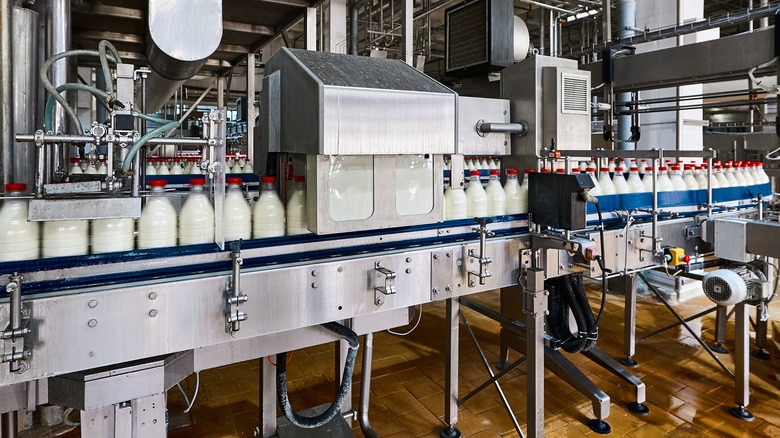Why Organic Milk Often Has A Longer Shelf Life
We know not to cry over spilled milk, but what about spoiled milk? According to EatByDate, the unopened, nonfat variety can last up to 10 days, but all kinds of milk can only last up to a week beyond their expiration date once opened. This fairly short shelf life is partly why a staggering amount of the dairy product is wasted annually. According to The Guardian, 116 million tonnes of milk are thrown away globally — one in six pints produced — and almost half of this is discarded before hitting stores.
Consumers may be throwing away milk for a few reasons: They might not understand expiration date labels, buy more than they need, or wait too long to drink it...the list goes on (via ScienceDirect). One dairy product that may help combat this waste is organic milk, which generally has a longer shelf life than regular milk — making it less likely to go bad before it's been consumed. According to Humboldt Creamery, organic milk comes from cows that aren't given antibiotics or hormones for growth or reproduction and get at least 30% of their food from the pasture. Healthline states that organic milk has similar amounts of calcium, potassium, and sodium as regular milk, although it contains more polyunsaturated fats. The reason for its longer shelf life, however, has nothing to do with the nutrients in it.
Organic milk can take the heat
Organic milk will usually last longer than regular milk because of a process called pasteurization. According to Britannica, when the dairy product is pasteurized in the U.S., it's heated to at least 145 degrees for half an hour to kill microorganisms that can cause disease and spoilage. Organic milk, however, is usually subjected to ultrahigh temperature (UHT) pasteurization, where it's heated to at least 280 degrees for two seconds (via Cornell CALS). According to Undeniably Dairy, this process means that the resulting product is even less likely to spoil or contain harmful bacteria, and can be left out before opening for around three months.
So why does the organic version receive this special treatment? The New York Times reports that because less organic milk is made than regular milk, it usually has a longer way to go before reaching grocery stores, so it needs UHT pasteurization to survive the trip. Because of its exposure to higher temperatures, however, the taste of the more natural variety may differ slightly; WGNO reports that higher heat caramelizes the sugars in organic milk, leading to a sweeter flavor.
If you're concerned about your milk spoiling too quickly or just want to see what a difference in cow treatment will yield, you may want to get your hands on a bottle of organic milk. Even if you're not craving it right now, don't worry — you'll have three months from purchasing to try it.

